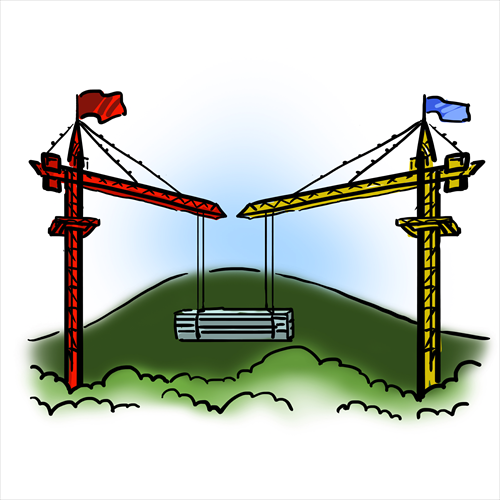US pays overdue attention to Africa with an eye on Beijing

Illustration: Liu Rui/GT
While the Ebola virus wreaks havoc across Western Africa, the 2014 US-Africa Leaders Summit, described by the Washington Post as "an unprecedented summit," was recently held in Washington.
The White House announced $33 billion in commitments, aimed at strengthening its stagnant economic and trading cooperation with Africa and encouraging more US firms to enter the continent. In 2013, trade volumes between the US and Africa just topped $100 billion, less than half Sino-African trade.
Many observers hold that the US is engaging with Africa with a view to rivaling with China. Nevertheless, there is ample room for Beijing and Washington to cooperate in Africa, helping to build prosperity and stability on the continent.
During an interview with The Economist on August 2, US President Barack Obama said, "There is a real recognition of opportunity there […] The US can be central in moving Africa into the next stage of growth and integrating it into the world economy."
The US has long neglected Africa. As the first African-American president, During his first term, President Barack Obama's only trip to Africa was a one-day lightning visit to Ghana.
However, given Africa's rapid development, Washington can no longer afford to ignore it. The IMF has estimated that Africa's economy will expand by 5.8 percent in 2015. The continent's improving business environment in recent years has resulted in some 350 million people gaining entry to the middle class.
Abundant natural resources are still a notable attraction in Africa, making it one of the world's newest battlegrounds in the fight for oil and gas. Cameroon, Ghana, Kenya, Tanzania and Uganda are becoming important oil producers. Sizable offshore natural gas has been discovered in Mozambique and Tanzania. And South Africa is in possession of considerable shale gas reserves.
African countries expect external players not to gobble up its resources, but to invest in its future by improving its education, healthcare and human resources.
The US has lots of rules and red tape when it comes to international development, but lacks capital and sufficient respect for Africans.
Meanwhile, China is apt at building highways, bridges and dams, but lacks experience in engaging with African civil society. Although China has helped construct many large stadiums and other buildings, a large number of ordinary Africans are still without sufficient water, electricity and food.
In Sub-Saharan Africa, more than two-thirds of residents lack the access to power, with some rural areas as high as 85 percent. According to the International Energy Agency, more than $300 billion is needed to realize the goal of general electrification by 2020.
During his trip to Africa in 2013, Obama proposed a Power Africa initiative, but said that the US could only invest $7 billion during the initial stage. Americans and US Congress are increasingly reluctant to spend on international development aid.
Yet there is still good news. The Financial Times reported that China has invited the US to cooperate in building the Inga III dam, a $12 billion dam project in the Democratic Republic of Congo.
The talks on the collaboration gathered momentum at the sixth China-US Strategic and Economic Dialogue in Beijing in July. The Inga III dam will likely become the largest hydropower engineering project in the world, and the World Bank has funded an assessment program of it.
Quite a few US scholars maintain that Beijing's engagement with Africa poses a fundamental threat to Washington's goals of promoting democracy, good governance and sustainable development in a relatively backward continent. But more and more people are willing to believe that China is playing a positive role.
Enduring peace and lasting prosperity in Africa is in the interests of both the US and China, so the two countries don't have to find themselves in a zero-sum game.
By increasing their engagement with and investment in Africa, Beijing and Washington should explore how the continent can be a launching pad for a new type of major power cooperation.
The author is a research fellow with the Charhar Institute and an adjunct fellow with the Center for International and Strategic Studies, Peking University. opinion@globaltimes.com.cn